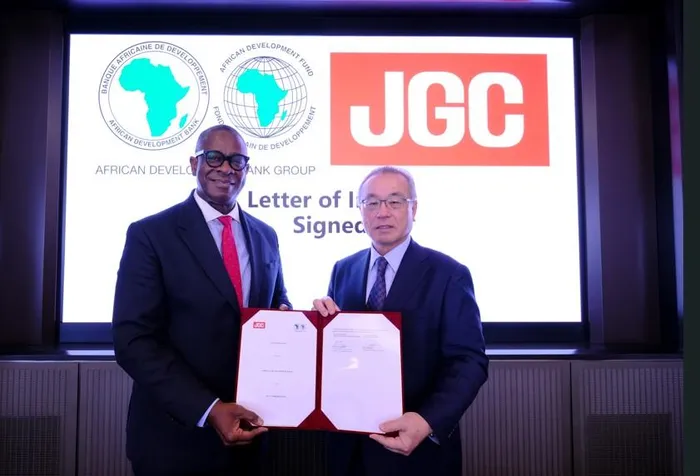AfDB, Japan’s JGC partner to advance sustainable aviation fuel development in Africa
AVIATION

AfDB Vice President for Private Sector, Infrastructure & Industrialization, Solomon Quaynor and Shoji Yamada, Representative Director and President, JGC Corporation sign agreement in Yokohama
Image: Supplied
The African Development Bank (AfDB) and Japan’s JGC Corporation have signed a Letter of Intent to collaborate on developing sustainable aviation fuel (SAF) projects across Africa — a move that could help accelerate the continent’s transition toward greener air transport.
The agreement was signed on the sidelines of the Ninth Tokyo International Conference on African Development (TICAD9) held in Yokohama last month, by Solomon Quaynor, AfDB Vice President for Private Sector, Infrastructure and Industrialization, and Shoji Yamada, Representative Director and President of JGC Corporation.
SAF refers to jet fuel produced from renewable resources such as plant oils, waste materials, or captured carbon, which can significantly reduce the aviation industry’s carbon footprint.
The Letter of Intent establishes a framework for joint promotion, knowledge exchange, and co-financing opportunities in the development of SAF and other green aviation initiatives on the continent.
As part of the agreement, the AfDB will facilitate coordination with public-sector aviation stakeholders, identify potential project pipelines, and explore financing mechanisms — including feasibility study support and debt or equity financing.
Meanwhile, JGC Corporation will conduct demand and technical feasibility studies, assess deployment opportunities based on local infrastructure and resources, and help transfer Japanese clean-energy technology to African markets.
The initiative aligns with the AfDB’s sustainable transport, mobility, and energy transition strategy, aimed at decarbonizing key sectors of Africa’s economy while supporting industrial growth and innovation.
Quaynor said the partnership represents an important step toward reducing emissions and enhancing competitiveness in Africa’s aviation sector.
“Adopting sustainable aviation fuel in Africa is a crucial component of the journey to cutting the continent’s carbon dioxide emissions,” he said.
“Moreover, it should boost the competitiveness of the sector over time. This partnership with JGC will help unlock new opportunities for green aviation and position Africa as a pacesetter in the sector.”
JGC’s president, Shoji Yamada, said the company is eager to apply its engineering expertise to Africa’s decarbonization efforts.
“We are proud to collaborate with the African Development Bank in advancing sustainable aviation fuel in Africa,” Yamada said.
“By leveraging our experience in plant engineering and sustainable energy, we aim to contribute to Africa’s decarbonization efforts while fostering local economic growth and innovation.”
If successful, the partnership could mark a milestone in Africa’s clean-energy transition, positioning the continent to play a leading role in the global sustainable aviation market, expected to grow exponentially over the next decade.
BUSINESS REPORT